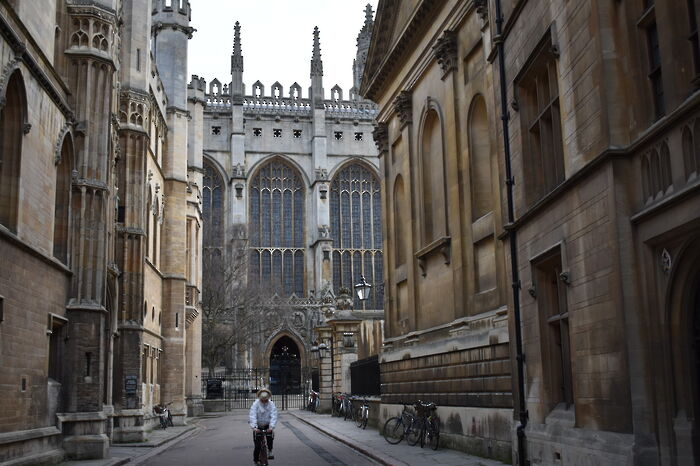Beef or no beef, Cambridge can’t call itself sustainable if divestment is still off the cards
The University must take much larger steps to combat climate change in the face of imminent ecological collapse, argues Georgie Newson-Errey

Earlier this month, a report released by the University Catering Service (UCS) revealed that, by removing beef and lamb from their menus, they have managed to cut carbon emissions by 33%. The report received extensive and generally positive press coverage, with publications incorporating the decision into a wider narrative of growing sustainability awareness within universities. The fact that the story garnered media attention is encouraging, as coverage of this sort spreads awareness of the scientific consensus that switching to a plant-based diet is one of the most effective ways of reducing our carbon footprint. However, beef or no beef, Cambridge cannot claim to be an environmentally friendly institution whilst maintaining its current divestment stance.
Despite the University’s promise earlier this year to evaluate said stance, and the fact that multiple colleges – including, most recently, Jesus College – have now committed to withdrawing from the industry, overall progress has been shamefully slow. The UCS is, of course, only a small component of a large institution, and those responsible for implementing the menu changes are not those with the power to instigate a University-wide divestment program.
But the fact that the University is benefitting from the coverage of the UCS’s commendable decision means that the case is reminiscent of many recent examples of so-called ‘greenwashing’. Greenwashing can imply mere rhetorical trickery: the labelling of products or decisions as ‘sustainable’ or ‘ethical’ when they are, in reality, nothing of the sort. As the climate crisis occupies a more prominent place in the public consciousness and consumer demand for environmentally-friendly choices increases, we will likely see more and more of this.
It is imperative that institutions like Cambridge lead the way forward in sustainability
The phrase can also, however, refer to the arguably more insidious practice of instigating small-scale projects or minor policy adjustments and then using these changes as a smokescreen for the ecological destruction being wreaked behind the scenes. As part of their biggest global campaign since the Deepwater Horizon oil spill of 2010, BP recently released a series of video ads focusing on their investment in renewable energy sources and charging networks for electric vehicles. These ads are not straight-up fictitious – BP is investing in these areas – but they are misleading with regards to the scale of these endeavours. In 2018, only 2.3% of BP’s overall investment went towards low-carbon options, with the remaining 97.7% funding fossil fuel extraction.
Multinational energy companies are not the only corporations who engage in these sorts of PR strategies. This year, multiple cruise lines have announced that they will ban single-use plastic products on their ships, an act that seems laudable until you remember that spending seven days on a cruise ship more than doubles your carbon footprint for that week.
To oppose instances of greenwashing, whether locally or further afield, is not to diminish the importance or potency of more minor sustainable changes. Going meat-free – or banning single-use plastics, or investing small amounts of money in renewables – is a small step, but it is not a futile one. Small steps, however, become problematic in contexts in which much larger steps are possible. As individuals, cutting out animal products is one of the most effective ways of curtailing our carbon expenditure, but Cambridge is not an individual – it is a powerful institution capable of instigating far more serious changes. Making sustainable food choices is important, but it cannot be enough.
It is important to recognise that there is hard work being done by many academics and students within the University to expand its capacity for positive environmental change, whether via research strategising or activism. This fact makes the University Council’s aversion to full divestment even more of an affront. The UCS’s decision should be regarded as a signal – not to the general public that Cambridge is a sustainable institution, but to the University Council that, as the University becomes ever more consciously greener, the issue of divestment becomes ever more prominent.
Hopefully, the next time Cambridge makes headlines for its sustainability initiatives, much more radical changes will be occurring. Along with full divestment, how about a Goldsmiths-style pledge to go carbon neutral in a matter of years? The notion might seem idealistic, but, if the carbon crisis is to be averted, these sorts of drastic measures are necessary. In the face of imminent ecological collapse, it is imperative that institutions like Cambridge lead the way forward in sustainability – and that means cutting ties with fossil fuel companies as well as cutting out lamb and beef.
 News / SU reluctantly registers controversial women’s soc18 December 2025
News / SU reluctantly registers controversial women’s soc18 December 2025 Features / Should I stay or should I go? Cambridge students and alumni reflect on how their memories stay with them15 December 2025
Features / Should I stay or should I go? Cambridge students and alumni reflect on how their memories stay with them15 December 2025 News / Dons warn PM about Vet School closure16 December 2025
News / Dons warn PM about Vet School closure16 December 2025 News / Cambridge study finds students learn better with notes than AI13 December 2025
News / Cambridge study finds students learn better with notes than AI13 December 2025 News / Uni registers controversial new women’s society28 November 2025
News / Uni registers controversial new women’s society28 November 2025









